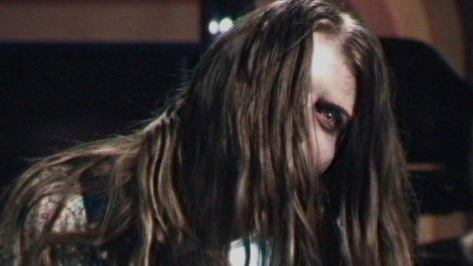Since I was a preteen, I have been insomniac off and on. Thus, I spent a good number of nights in my formative years in my parent’s basement flipping through television channels, broadcast and cable. I suppose late night TV, as a result, has something of a hold on me. Not late night in the Jay Leno sense, but in that sense of discovering weird programming that no self-respecting network/station exec would allow to be aired in the daylight. Footage of Anton LaVey on PBS, things of that nature.
Films like Ghostwatch, WNUF Halloween Special, VHYes and the like play into the odd draw of analog media, asking the question of what happens when abnormal occurrences happen on the otherwise standard formats of television programming. Cameron and Colin Cairnes’ Late Night with the Devil asks a similar question, along with one or two other intriguing questions regarding the nature of the television business. (It has also sowed some controversial discourse given its implementation of non-analog tech in its post-production – a conversation too complicated to delve into presently).
Like Ghostwatch, Late Night with the Devil presents itself as a real-time taping of a television program on Halloween night. Unlike Ghostwatch, the Cairnes’ film does not attempt a verisimilitude in presentation (the former aired on BBC1 under the auspices of being a true live broadcast). Late Night begins with a documentary-style intro, narrated by Michael Ironside, in which we meet television personality Jack Delroy (David Dastmalchian), a second-rate Johnny Carson whose late night show struggles increasingly to maintain ratings. The tragic arc of Delroy includes the death of his wife Madeleine (Georgina Haig), followed by his desperate attempts to get eyes on his show using stunts and gimmicks.
The mock documentary then drops us into Halloween night 1977, where one of these stunts goes awry. In doing so, we lose the attempt at realism, as the film moves to a rhythm of bouncing between on-air recording and the events that occur during the commercial breaks. The foregoing of verisimilitude is a minor nag in a film that otherwise does a good job of capturing the feel of a 1970s talk show. Not to mention that the station breaks provide some of the more clever and intriguing bits of narrative heightening, which makes them integral to the overall effect.
The Halloween broadcast comes off like a hokey stunt from the get-go, with Delroy delivering canned monologue jokes and a psychic medium fumbling through his act. Later, the extent to which the gimmicks are actually gimmicks is called into question, as Delroy attempts to commune with the devil on live television using a young girl (Ingrid Torelli) as a vessel. The slow unraveling of the show is the main attraction of Late Night with the Devil, and it is an entertaining experience from beginning to the end.
The film does not go quite far enough in resolving all of the tensions involved in the demonic possession of it all, and it lacks clarity in its inclusion of broad conspiratorial entities a la the Bohemian Grove. Nor is it particularly interested in shoring all of these elements up in any concrete manner. The Cairnes seem more invested in centering in on what this odd experience means to Delroy himself. This results in a visually appealing yet narratively limited final moments. Given that (despite Dastmalchian’s fine performance) Delroy is only ever presented as an on-air personality, where it is occasionally difficult to discern his sincerity or genuine personality, the emotional weight of some of these final images rings slightly hollow.
What rings less hollow is the spectacle of the climax. While it may not be enough bombast for some, given just how slow the build is to get there, the rapid escalation of events was more than enough for me. That it includes a few canny practical and digital effects makes it all the better.
Ultimately, Late Night with the Devil is a bit of light horror entertainment (it’s less “scary” and more “spooky”). What it lacks in narrative, thematic, and emotional depth it makes up for in clever spectacle.
Late Night with the Devil: B
As always, thanks for reading!
—Alex Brannan (Letterboxd, Facebook)

